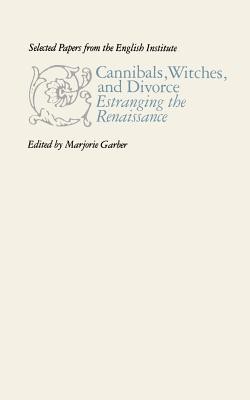
- We will send in 10–14 business days.
- Publisher: Johns Hopkins University Press
- ISBN-10: 0801877385
- ISBN-13: 9780801877384
- Format: 12.7 x 20.3 x 1.4 cm, softcover
- Language: English
- SAVE -10% with code: EXTRA
Cannibals, Witches, and Divorce (e-book) (used book) | bookbook.eu
Reviews
Description
When we speak of the English Renaissance, what is it that we are naming, what are we recognizing reborn? As the essays in this latest collection from the English Institute demonstrate, our basic notions of the period have themselves been reconceived. In Cannibals, Witches, and Divorce, seven critics defamiliarize the images of the Renaissance "to permit the repressed to return, to acknowledge the presence of the unassimilable ghost the mark of difference of an age that is at once self and 'other'."
John Hollander discovers a "hidden undersong" in the Spenserian lyric, while Patricia Parker examines the question of feminine dominance and male resistance in the Bower of Bliss. Stephen Orgel and Steven Mullaney document the Renaissance encounter with the alien "other" in essays on The Tempest and The Merchant of Venice. Macbeth, in Janet Adelman's reading, encodes the fantasy of an absolute and destructive maternal figure. Marjorie Garber addresses the Shakespearean authorship controversy in the context of the subversive uncanniness of the texts themselves; Mary Nyquist discusses Milton's Eve, his divorce tracts, and the exegetical tradition as recently examined by feminist biblical scholars. Together, these essays explore Renaissance discourses of estrangement as strategies for the construction of the self and the world.
EXTRA 10 % discount with code: EXTRA
The promotion ends in 17d.18:17:59
The discount code is valid when purchasing from 10 €. Discounts do not stack.
- Publisher: Johns Hopkins University Press
- ISBN-10: 0801877385
- ISBN-13: 9780801877384
- Format: 12.7 x 20.3 x 1.4 cm, softcover
- Language: English English
When we speak of the English Renaissance, what is it that we are naming, what are we recognizing reborn? As the essays in this latest collection from the English Institute demonstrate, our basic notions of the period have themselves been reconceived. In Cannibals, Witches, and Divorce, seven critics defamiliarize the images of the Renaissance "to permit the repressed to return, to acknowledge the presence of the unassimilable ghost the mark of difference of an age that is at once self and 'other'."
John Hollander discovers a "hidden undersong" in the Spenserian lyric, while Patricia Parker examines the question of feminine dominance and male resistance in the Bower of Bliss. Stephen Orgel and Steven Mullaney document the Renaissance encounter with the alien "other" in essays on The Tempest and The Merchant of Venice. Macbeth, in Janet Adelman's reading, encodes the fantasy of an absolute and destructive maternal figure. Marjorie Garber addresses the Shakespearean authorship controversy in the context of the subversive uncanniness of the texts themselves; Mary Nyquist discusses Milton's Eve, his divorce tracts, and the exegetical tradition as recently examined by feminist biblical scholars. Together, these essays explore Renaissance discourses of estrangement as strategies for the construction of the self and the world.


Reviews